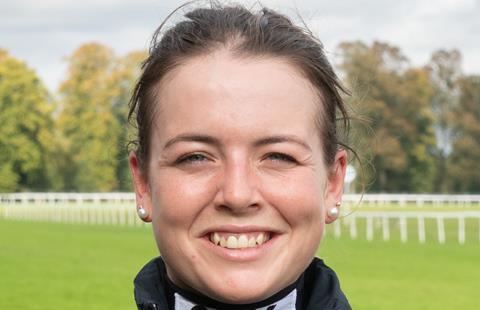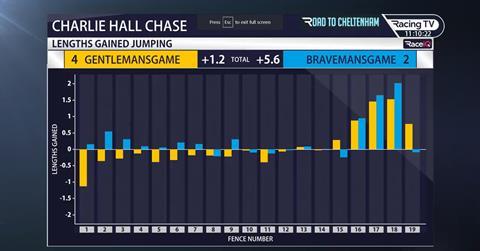Page Fuller was a professional jockey for five years before choosing a less well-trodden path for former athletes

Many athletes have made the move from professional sportsperson to pundit or presenter, but not as many have decided to go behind the camera after retirement.
However, that is exactly what Page Fuller, lead editorial analyst at Ellipse, has done. Following ten years as a jockey, the latter five of which were as a professional, Fuller retired last year following a number of injuries and setbacks. Now, almost a year later, she is helping to provide the data that enhances broadcasts on Racing TV and ITV following a deal between Ellipse and RMG in 2023, and working with those in front of and behind the camera, such as fellow ex-jockey and now pundit Ruby Walsh, on new ways to communicate the sport to viewers.
Speaking to Broadcast Sport, she explained: “You end up probably not preparing well enough for retirement, and I didn’t know what to do. Then this popped up.”
She went for it despite others encouraging her to get in front of the camera, “I’m probably more maths focused,” Fuller studied economics at university before dropping out to become a jockey, “and didn’t really fancy myself in front of a camera. So I was delighted with the opportunity to support the broadcast side of things, whilst doing something quite interesting and being able to apply my racing experience to that job.”
Now getting settled into the new role, she’s picked up a lot of new knowledge along the way, “You think a camera just points at you and it’s broadcasted. You don’t realise how many things go on behind the scenes. That has been such a learning experience, and I’ve really enjoyed it because I’m not sat in an office all day. That has made the transition easier.”
That learning began before she had finished racing, “I was really lucky that with the Jockeys Education and Training Scheme, just, they really focused me in on making the most of that time off. – while injured at the end of her career.
“Every time I was off, I got a phone call from [general manager and career coach at JETS] Lisa Delaney going, ’Page, what are you doing? Make the most of your time.’ It’s very easy to say, ’I’ve done all I can,’ but there’s always something else you can do.”

Speaking ahead of International Women’s Day, one area in which being a professional jockey did prepare Fuller for the broadcasting world was working in a male-dominated space: “I come from a very, very male dominated sport. Having had ten years working in that, I’m used to that sort of environment. Actually, when I moved into this, it is probably a less male dominated environment. There are eight of us on our team, including two females. For me, normally I’d be going in and if there were 30 jockeys I might be the only female or there’d be two of us.”
She hopes that this is changing on both sides of the camera, and horse riding may have a particular advantage: “A nice thing about racing is that males and females compete against each other, and you now have plenty of female presenters coming in…and who have credibility having competed directly in the sport they’re talking about.”
Having these role models on and off the field is key to getting more women into broadcast and production, Fuller believes: “Look at the Lionesses and all the amazing female sports people that are only just coming through. Then you’ve got female role models within sport, which I’m hoping will knock on into the people that provide the broadcasts. I’m in this job because I love horse racing. The more female footballers you can engage with and relate to, the more you’re going to love football as a female. So I really hope that with all these female role models that are emerging within sport, that should have a knock on effect into the industry too.”
On top of this, there are things that everyone in the industry, male and female, can do too: “The main thing is to make people feel comfortable in their workplace environment. And, just because you feel like you’re comfortable in a work environment doesn’t mean that the person the person sitting next to you feels that same way. With females in a male dominated industry, we probably just need to care for that person sat next to us and actively make sure that they’re feeling comfortable.”




No comments yet